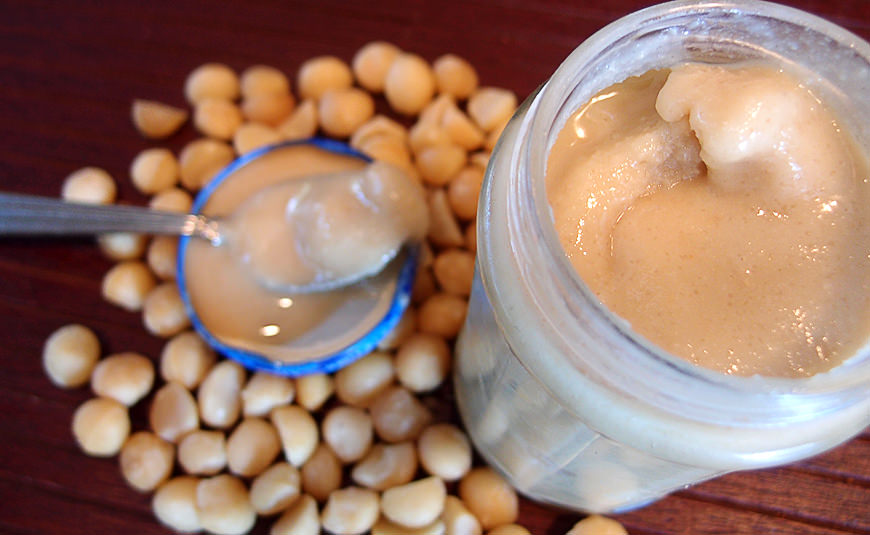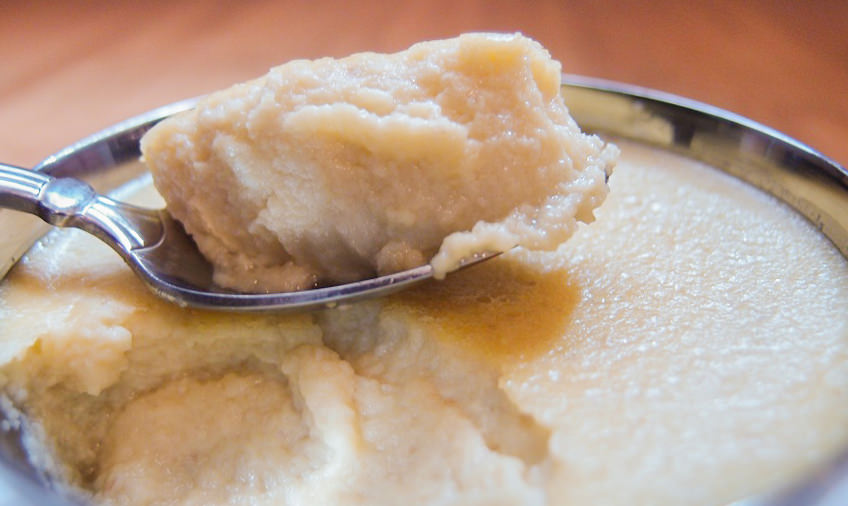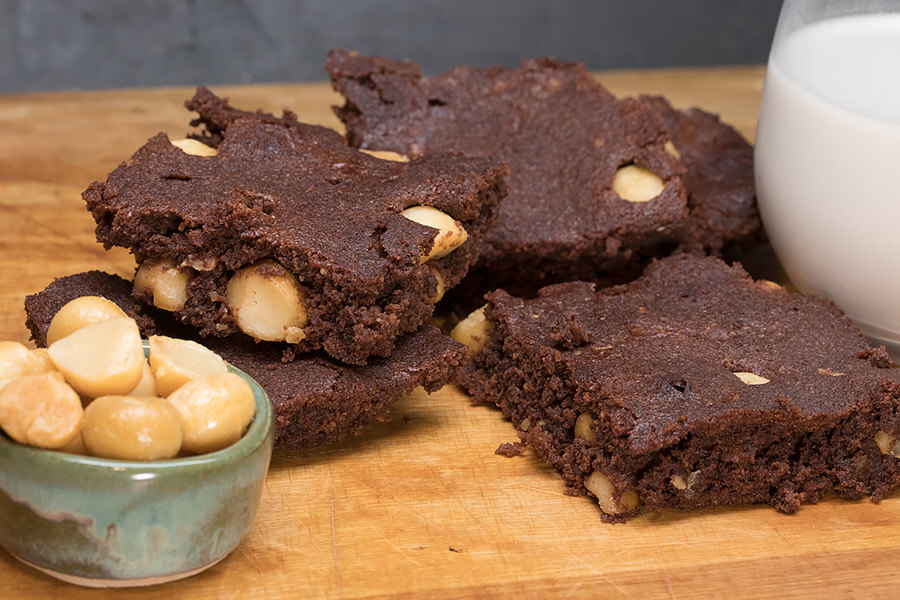Nut consumption has been found to improve our health in a variety of ways, including:
- helping with weight loss
- enhancing skin health
- protecting us from heart disease and cancer
- improving blood pressure
- reducing cholesterol, blood glucose, and HbA1c levels
- decreasing our risk of early mortality
However, when it comes to choosing the healthiest nut of them all, there is no clear winner. Each one has a slight edge over the others in varying aspects (depending on the nutritional needs of the person consuming them).
With that being said, if nuts were ranked based on their overall healthiness, macadamia nuts would be at the top of the list. They are nutritional powerhouses that set themselves apart from the rest because of their high monounsaturated fat, thiamin, and manganese content.
Plus, macadamia nuts are often grown sustainably, making them a great go-to for the eco-conscious consumer looking to replace or reduce their almond consumption (because of how much water these popular nuts take up).
Overall, macadamia nuts provide us with an environmentally friendly way to get all of the benefits of nut consumption, along with many unique benefits that we will explore later in this article.
A Quick Look at the History of Macadamia Nuts
The macadamia was named in honor of the Scottish-Australian chemist John Macadam in 1857, decades after it was first discovered in Australia.
It was then taken to Hawaii where it was planted on the Big Island in the late 1800s.This sparked the boom in macadamia nut production that is responsible for the strong association between Hawaii and the macadamia nut.
In fact, Hawaii eventually became one of the top producers of the macadamia. However, in recent years, at least a dozen countries throughout the world have taken to growing these nuts, with the majority of the macadamia market belonging to South Africa and Australia.
Fortunately, for us nut lovers, macadamia nuts are more widely available than ever before. This means that more of us can experience the benefits of these nutrient-dense nuts more often.
A Nutrient Breakdown of Macadamia Nuts: A True Nutritional Powerhouse
Macadamia nuts are loaded with healthy monounsaturated fatty acids, fiber, B-vitamins, and essential minerals. They also serve as an ideal low carb snack, with only 1.5 grams of net carbs per serving.
Here’s an overview of the nutrients we get from 1 ounce of raw macadamia nuts (28 grams or ~10 nuts):
- 203.5 Calories
- 3.9 g Carbohydrate
- 2.4 g Fiber
- 1.5 g Net Carbs
- 21.5 g Fat
- 16.7 g Monounsaturated Fatty Acids
- 2.2 g Protein
- 0.34 mg Thiamin (23% DV)
- 0.05 mg Riboflavin (3% DV)
- 0.7 mg Niacin (4% DV)
- 0.21 mg Vitamin B5 (2% DV)
- 0.08 mg Vitamin B6 (4% DV)
- 24.1 mg Calcium (2% DV)
- 0.21 mg Copper (11% DV)
- 1.05 mg Iron (6% DV)
- 36.9 mg Magnesium (9% DV)
- 1.17 mg Manganese (59% DV)
- 104.3 mg Potassium (3% DV)
- 1.02 mcg Selenium (1% DV)
When consumed together in the delicious little package of a macadamia nut, these nutrients provide us with a plethora of benefits.
10 Science-Backed Benefits of Macadamia Nuts
Theoretically, these nuts can improve the health of every cell in the body because of how many healthy fats, vitamins, and minerals they contain. However, for the purposes of this article, let’s stick with the 10 benefits that are backed by the current research.
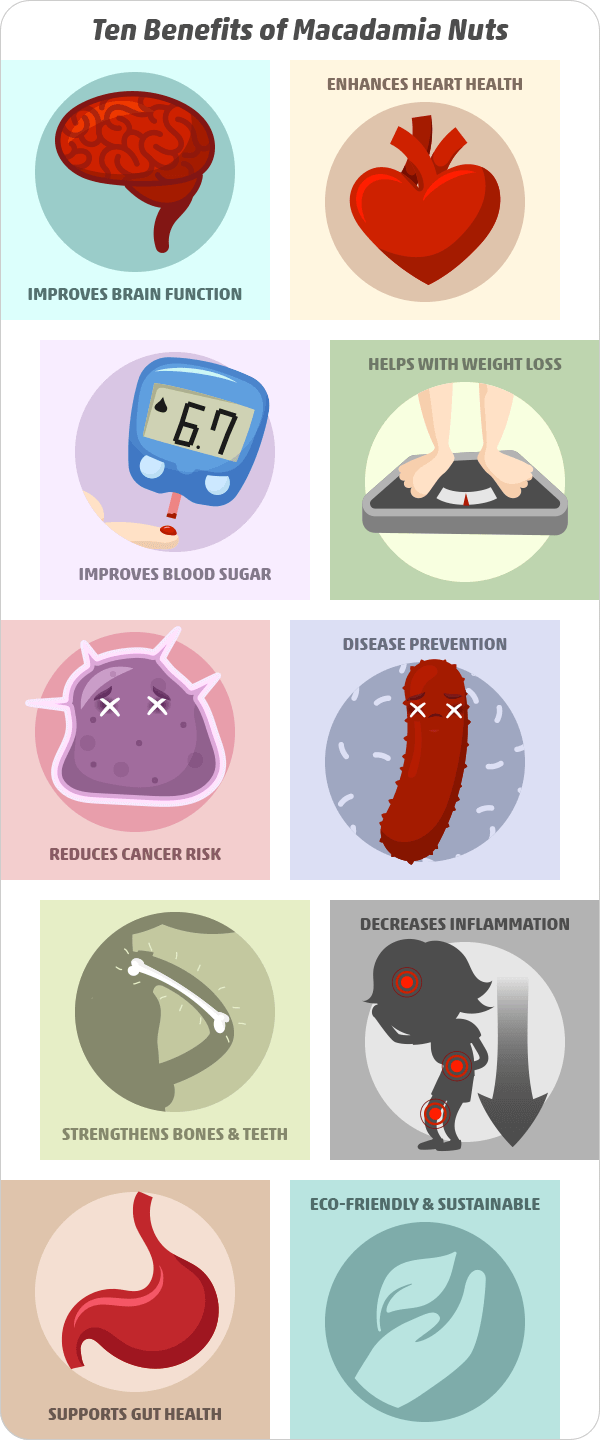
1. Prevents Various Chronic Diseases
The healthy fats, micronutrients, fiber, and antioxidants found in macadamia nuts make them a valuable tool for staving off disease. Many meta-analyses on nut consumption provide us with clear evidence that this is the case:
- A 2015 meta-analysis study published in The American Journal of Clinical Nutrition found nut consumption had a significant positive association with lower risks of cardiovascular disease and cancer-related mortality.
- A 2010 report published in Nutrients reviewed 150 scientific studies, which concluded that nut consumption was shown to have many health benefits, including lowering the risks for cardiovascular disease and cancer.
2. Improves Brain Function
Macadamia nuts contain more healthy monounsaturated fatty acids than any other nut. Two of these monounsaturated fats are known for their brain-boosting benefits: oleic acid and palmitoleic acid.
Oleic acid is one of the fats responsible for olive oil’s health benefits. When it comes to brain health specifically, this fatty acid helps us by decreasing blood pressure and reducing our risk of stroke.
Along with that, macadamia nuts provide us with an abundance of palmitoleic acid, which has been shown to be a major component of myelin (the fatty protective coating around our neurons). This means that this fatty acid plays a crucial role in healthy brain development throughout our lives.
From a micronutrient perspective, macadamias are rich in both copper and thiamin. Without copper, our ability to absorb and use iron would be inefficient, which would cause issues brain oxygenation.
Meanwhile, converting carbohydrates into energy would not be possible without the help of thiamin that macadamia nuts provide us. Even when you are on the ketogenic diet for several months, some of your brain cells will still need glucose and thiamin to function properly.
Altogether, the two fatty acids, copper, and thiamin found in macadamia nuts help maintain brain health and keep it functioning as efficiently as possible.
3. Enhances Heart Health
Not only do the monounsaturated fats found in macadamias boost brain health, but they also help improve most of the biomarkers associated with heart disease risk (i.e., triglycerides, blood pressure, and cholesterol levels).
The soluble fiber that you’ll get from these nuts will help you to further improve your cholesterol levels and give you more peace of mind and peace within your heart as well.
However, these aren’t the only ways in which macadamia nuts help to improve heart health. The researchers of a study that tested the effects of macadamia nuts on various biomarkers summed up their benefits perfectly with this concluding statement:
“…short-term macadamia nut consumption modifies favourably the biomarkers of oxidative stress, thrombosis and inflammation, the risk factors for coronary artery disease, despite an increase in dietary fat intake. These data, combined with our previous results on cholesterol-lowering effects of macadamia nuts, suggest that regular consumption of macadamia nuts may play a role in the prevention of coronary artery disease.”
In other words, macadamia nuts have the potential to improve many of the most important factors associated with heart disease. Or, put more simply, macadamias help your heart (and your overall health).
4. Improves Blood Sugar Regulation
Nut consumption, in general, is known to improve glycemic control in patients with type 2 diabetes. This is most likely due to the fact that nuts have a unique profile of macronutrients, micronutrients, and other bioactive compounds that help improve blood sugar levels and prevent the progression of issues related to type 2 diabetes.
For example, palmitoleic acid — one of the fats we mentioned earlier — has been found to increase insulin sensitivity, which plays a major role in preventing the onset of type 2 diabetes.
5. Helps with Weight Loss
Several observational studies indicate that people who consume more nuts tend to have healthier body weights. This is no surprise when you consider the fact that nuts contain highly satiating nutrients that naturally make us eat fewer calories throughout the day.
Let’s take macadamia nuts for example (you probably saw that coming). The dietary fiber in macadamia nuts can help increase satiety by binding to water, making you feel full.
Also, when you eat macadamias in place of other common snack foods, you will be providing your body with healthy fats that reduce inflammation and provide us with an efficient energy source. This helps increase your likelihood of burning fat and losing fat.
To put this benefit more succinctly: macadamia nuts are a healthy and filling food, eating them will cause you to eat fewer calories than usual, which will help you lose weight.
6. Reduces Cancer Risk
In general, nut consumption is associated with reduced cancer risk. One of the reasons why this is the case is because the fiber commonly found in nuts (including macadamia nuts) has been found to lower the risk of breast, mouth, throat, esophageal, colon, and prostate cancer.
7. Strengthens Bones and Teeth
The calcium, phosphorus, magnesium, and manganese found in macadamia nuts provide us with the raw materials we need to build strong bones and teeth. Along with that, we also get plenty of monounsaturated fats, which can help keep inflammation from breaking down our gums.
8. Reduces Inflammation
Earlier we touched on the fact that macadamia nuts can reduce the inflammation that can increase our heart disease and gum damage risk. Fortunately, these effects translate to the rest of our bodies as well.
To illustrate this point, let’s take a look at a recent study that surveyed the effects of nut consumption on19,386 participants. After analyzing the data, The researchers found a positive association between regular nut consumption and a decreased risk of overall premature mortality.
The most benefit was experienced by the subjects who ate eight or more servings of nuts every week. One of the factors responsible for this correlation is the decrease in low-grade inflammation caused by increased nut consumption.
On a practical level, these findings suggest that we would have to consume a serving of nuts every day to maximize their inflammation-reducing benefits. To reach this intake level with macadamia nuts, you would only have to eat around 10 to 12 nuts without the shell per day.
9. Supports Gut Health
Many of us aren’t getting enough fiber in our diets, and the adverse effects of this are manifesting in the digestive tract.
Without getting enough fiber, the good bacteria in your gut will not be able to proliferate, protect your gut from pathogens, and help your gut heal between meals. Fortunately, macadamia nuts contain both soluble and insoluble fiber to help feed your good bacteria, prevent digestive issues like constipation, and flush toxins from your digestive tract.
Also worth noting is the fact that macadamias are particularly rich in copper, one of the minerals that support the enzymatic reactions responsible for digestive health.
Important caveat: Make sure you are aware of where you buy your macadamia nuts from. Research indicates that some tree nuts (macadamia nuts, included) are at risk for salmonella contamination.
10. Can Be Grown More Sustainably than Other Popular Nuts
In addition to being keto-friendly and healthy, macadamia nuts are often grown in an eco-friendly, sustainable manner.
Here are some reasons why macadamia nuts are more sustainable:
- They require less water than almonds.
- Their long and fruitful life cycle allows for an efficient and eco-friendly use of soil.
- The husks from macadamia nuts can be used to power the facilities that process the nuts, composted to make mulch and fertilizers, and, in some cases, added to animal feed.
Are Macadamias Healthier for You than Other Nuts?
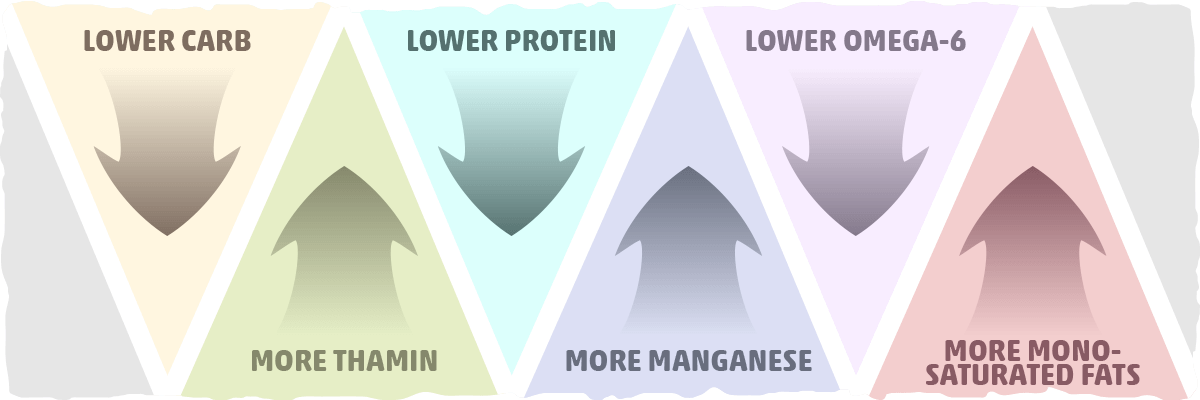
Although all nuts are healthy in some way, it can be argued that the macadamia nut is the healthiest nut — especially if you are on the keto diet.
Let’s take a look at some of the advantages that macadamias have over most nuts:
- They are lower in carbs and net carbs than most nuts.
- They contain the most thiamin (vitamin B1) compared to other commonly consumed nuts.
- They have more manganese than most nuts, which helps with nutrient absorption, production of digestive enzymes, bone development, and immune-system defenses.
- They contain less protein than most nuts, which makes them great for keto.
- They provide us with more healthy monounsaturated fats than any other nut.
- They have the lowest amount of inflammatory omega-6 fats per serving compared to other commonly consumed nuts.
Altogether, these characteristics are what make macadamias one of the best snacks for the keto diet. They serve as a delicious nutrient-dense package of healthy fats that give you so many upsides with no downsides (unless you are allergic to them).
Just make sure you are mindful of where you buy them from and how you store them to get the most from your macadamia nuts.
How to Buy and Store Your Macadamia Nuts

Macadamia nuts can be purchased and eaten in a number of different ways.
If you’re looking to get the maximum benefit from these nuts, stick with the raw, unflavored, unsalted varieties. The healthiest macadamia nut products will only have one ingredient: macadamia nuts.
Although roasted nuts tend to taste better, it is important to remember that some of the vitamins and fats in those nuts may break down during roasting, making them virtually useless to the body.
With that being said, roasted macadamia nuts can still be a healthy snack. Just make sure you check the ingredients label for any added ingredients, sugar, or processed oils that may impair your progress.
One caveat to keep in mind when buying macadamia nuts is that some producers have been struggling with salmonella contamination. In almost every case the macadamias were recalled before they were consumed, so it is just something to be mindful of when choosing between different products.
Once you’ve done your research and found the right macadamia nuts for you, make sure you store them in an airtight container in a cool dry place, like your pantry. However, If you’re not going to eat them in the next two to three weeks, we recommend freezing them to keep the fats from going rancid.
Is There Anyone That Shouldn’t Eat Macadamia Nuts?

Most people will be able to reap the benefits of macadamia nuts without any problems. However, there are some people (and animals) that should limit their consumption or eliminate them from their diet completely:
- People who have kidney issues. While macadamia nuts are relatively low in oxalate, they are pretty high in phosphorus, making them a concern for some kidney patients. If you have kidney-related health issues, ask your healthcare provider if you can consume macadamia nuts.
- People who have tree nut allergies. If you’re allergic to other tree nuts, avoid macadamia nuts as well.
- Macadamias are toxic to dogs. Ingestion may result in weakness and hind limb paralysis with the inability to stand, occurring within 12 hours of ingestion. Dogs tend to fully recover from macadamia toxicity within 24 to 48 hours.
The good news is that if you are pregnant or sensitive to gluten in any way, you can eat macadamias nuts. Macadamias are gluten-free (as long as they are processed in a gluten-free facility), and they are safe to consume in normal quantities when pregnant.
Macadamia Nut Recipes Worth Trying
If you are looking for some creative and delicious ways to add more macadamias into your diet, check these recipes out:
Homemade Macadamia Nut Butter
Nut butter is one of my all-time favorite guilty pleasures. And the fact that macadamia nuts are so healthy makes this nut butter recipe a keeper.
Plus, this recipe is so easy to make. All you really have to do is blend the nuts, add some coconut oil (or MCT oil for some extra ketone production) and keto-friendly sweetener, and blend again until smooth and creamy. Have it by the spoonful, add it to your fat bombs, or have it on some keto bread — this nut butter will not disappoint.
Click here to see the full recipe.
Roasted Celery and Macadamia Cheese
Did you know you can turn macadamia nuts into a diary-free cheese? Pair this with buttery roasted celery, and you’ll have one of the healthiest and most filling keto sides.
If you’d rather have something a bit less savory than this, feel free to combine our nut butter recipe with raw celery sticks to make a quick afternoon keto snack.
Click here to see the full recipe.
Speculoos and Macadamia Biscotti
Speculoos is spectacular. It is a Belgian crispy spiced cookie that is addictively good — and the smell may bring up the wonderful nostalgia of Christmases past.
This keto-friendly speculoos is twice baked, dry, and crunchy with the added healthy goodness of macadamia nuts. For a special treat, try dunking them in your ketoproof coffee.
Click here to see the full recipe.
Macadamia & Coconut Keto Custard
Looking to convert your Homemade Macadamia Nut Butter into a delicious keto dessert? This low-carb custard will not disappoint. It is the ultimate substitute for standard, sugar-packed custards.
The keto-friendly sweeteners provide it with the perfect amount of sweetness while the nut butter, eggs, and cream combine to provide a delectable texture and flavor. Don’t forget to try this out the next time you have a sugar craving.
Click here to see the full recipe.
Low Carb Macadamia Nut Brownies
You can’t go wrong with chocolate and macadamia nuts. The butteriness of macadamias blends with the flavor of cocoa so incredibly that you’ll be satisfied with every bite.
To take these keto brownies to the next level, I recommend blending up the macadamia nuts into smaller chunks. This way you can get the perfect blend of flavors in every bite.
Click here to see the full recipe.
Putting It All Together — Everything You Need to Know about Macadamia Nuts
Macadamias nuts are one of the healthiest nuts you can add to your diet — especially if you are on the keto diet. They are packed with health-promoting monounsaturated fats (more than any other nut) and provide us with a good source of the fibers, vitamins, and minerals that we need to thrive.
Here are just a handful of the benefits that you may get from adding macadamias to your diet:
- Improved brain function
- Enhanced heart health
- Improved blood sugar regulation
- Increased weight loss
- Reduced cancer risk
- Disease prevention
- Stronger bones and teeth
- Decreased inflammation
- Improved gut health
- Reduced environmental impact
Feel free to eat them raw, roast them, add them to your meals, or make a macadamia-nut based keto-friendly recipe. If you need some ideas on how you can add more of these nutritional powerhouses to your diet, look no further than these low-carb recipes:
- Low Carb Macadamia Nut Brownies
- Homemade Macadamia Nut Butter
- Macadamia & Coconut Keto Custard
- Speculoos and Macadamia Biscotti
- Roasted Celery and Macadamia Cheese
If your goal is to lose weight and improve your health by adding macadamia nuts to your diet, you may also be interested in incorporating a keto diet as well. It has been found to help people lose weight rapidly without skimping on flavorful foods. To learn more about this way of eating, check out our guide to the keto diet.
Sources:
- Macadamia nut consumption lowers plasma total and LDL cholesterol levels in hypercholesterolemic men. — NCBI
- Macadamia nut consumption modulates favourably risk factors for coronary artery disease in hypercholesterolemic subjects. — NCBI
- Nuts and Omega-6s — Mark’s Daily Apple
- Oh Nuts! — UCONN
- Abstract P326: Nut Consumption is Inversely Associated with Mortality in a Mediterranean Population: Prospective Results from The MOLI-SANI Study — Circulation
- Health Benefits of Nut Consumption — NCBI
- Nut consumption on all-cause, cardiovascular, and cancer mortality risk: a systematic review and meta-analysis of epidemiologic studies — The American Journal of Clinical Nutrition
- How Fiber Helps Protect Against Cancer — Physicians Committee for Responsible Medicine
- Tree Nut consumption is associated with better adiposity measures and cardiovascular and metabolic syndrome health risk factors in U.S. Adults: NHANES 2005–2010 — NCBI
- Effects of tree nuts on blood lipids, apolipoproteins, and blood pressure: systematic review, meta-analysis, and dose-response of 61 controlled intervention trials — NCBI
- Effects of nuts on postprandial glycemia, satiety and hunger sensations in healthy individuals — IOS Press
- Effects of moderate-fat (from monounsaturated fat) and low-fat weight-loss diets on the serum lipid profile in overweight and obese men and women. — NCBI
- Changes in diet and lifestyle and long-term weight gain in women and men. — NCBI
- Chronic administration of palmitoleic acid reduces insulin resistance and hepatic lipid accumulation in KK-Ay Mice with genetic type 2 diabetes — NCBI
- Effect of Tree Nuts on Glycemic Control in Diabetes: A Systematic Review and Meta-Analysis of Randomized Controlled Dietary Trials — NCBI
- Thiamin — MedlinePlus
- Copper in diet — MedlinePlus
- Fatting the brain: a brief of recent research — NCBI
- Olive oil consumption, plasma oleic acid, and stroke incidence: the Three-City Study. — NCBI
- DV of Vitamins & Minerals — FDA
- South Africa becomes king of macadamia nuts again — Fresh Plaza
- The Kitchen Thinker: Macadamias — The Telegraph
- Implications of Palmitoleic Acid (Palmitoleate) On Glucose Homeostasis, Insulin Resistance and Diabetes. — NCBI
- Effects of increasing dietary palmitoleic acid compared with palmitic and oleic acids on plasma lipids of hypercholesterolemic men. — NCBI
- The effect of tree nut, peanut, and soy nut consumption on blood pressure: a systematic review and meta-analysis of randomized controlled clinical trials. — NCBI
